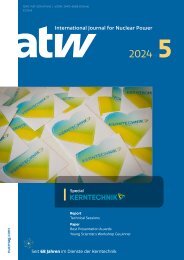atw - International Journal for Nuclear Power | 05.2022
Ever since its first issue in 1956, the atw – International Journal for Nuclear Power has been a publisher of specialist articles, background reports, interviews and news about developments and trends from all important sectors of nuclear energy, nuclear technology and the energy industry. Internationally current and competent, the professional journal atw is a valuable source of information. www.nucmag.com
Ever since its first issue in 1956, the atw – International Journal for Nuclear Power has been a publisher of specialist articles, background reports, interviews and news about developments and trends from all important sectors of nuclear energy, nuclear technology and the energy industry. Internationally current and competent, the professional journal atw is a valuable source of information.
www.nucmag.com
Sie wollen auch ein ePaper? Erhöhen Sie die Reichweite Ihrer Titel.
YUMPU macht aus Druck-PDFs automatisch weboptimierte ePaper, die Google liebt.
<strong>atw</strong> Vol. 67 (2022) | Ausgabe 5 ı September<br />
SERIAL | MAJOR TRENDS IN ENERGY POLICY AND NUCLEAR POWER 16<br />
The Global Renaissance<br />
of <strong>Nuclear</strong> Energy<br />
Björn Peters<br />
INTRODUCTION<br />
In the 1960s and 1970s, many countries have seen a fast buildout of nuclear power. The fastest buildout<br />
plan was introduced by France. Within only 13 years between 1980 and 1993, nearly 300 terawatt-hours<br />
of nuclear power production were added. In the 1990s, western countries stopped developing new nuclear<br />
power plants. Oil, coal, and gas were cheap commodities and carbon dioxide emissions were no topic of<br />
importance <strong>for</strong> decision-makers. <strong>Nuclear</strong> energy was too capital intense in comparison to fossil fuel-driven<br />
power stations. New political “green” movements emanated, that fought nuclear power, often funded by<br />
fossil fuel interests. The nuclear accident of Chornobyl, although technically impossible in all Western power<br />
stations, added to the erroneous fears that nuclear power could not be controlled sufficiently<br />
The communication style of the nuclear industry in<br />
Western countries – essentially focusing on technical<br />
in<strong>for</strong>mation <strong>for</strong> engineers, but ignoring the<br />
emotional side of the technology – created a void<br />
that greenish non-government organizations were<br />
happy to fill.<br />
Since the beginning of the 2020s, a global energy<br />
crisis started to evolve. Most of the reasons were<br />
policy-driven.<br />
Weather-dependent power sources, that had<br />
become dominant in several large countries, were<br />
underper<strong>for</strong>ming in the first half of 2021 due to<br />
unexpected weather. In Brazil, hydropower fell<br />
short of expectations, and in several European<br />
countries, wind energy. Un<strong>for</strong>tunately, these power<br />
sources had been built out without a proper, systematic<br />
analysis of the risks associated with increasing<br />
dependency on wind and solar irradiation in power<br />
production.<br />
To replace the energy, natural gas was used to<br />
produce electrical power, creating an unexpected<br />
increase in demand.<br />
In this light, many countries are considering or reconsidering<br />
nuclear energy as a stable, reliable, and<br />
relatively cheap source of energy, both <strong>for</strong> electricity<br />
and <strong>for</strong> industrial heat. As a relatively new trend,<br />
some countries foster the development of small and<br />
modular reactors (SMR). Around 70 companies<br />
globally are developing “new nuclear”, hence traditional<br />
pressurized water reactor (PWR) technologies<br />
and molten salt reactors (MSR) initially developed<br />
in the 1950s, or outright new designs that combine<br />
inherent safety with low production costs, such as<br />
Oklo, Copenhagen Atomics, or Dual Fluid Energy.<br />
This article outlines some trends in the global nuclear<br />
industry and argues that they have the potential<br />
to initiate a renaissance of nuclear power globally.<br />
We describe technological trends from an economic<br />
perspective and discuss their social and political implications<br />
as enablers <strong>for</strong> a transition from a world<br />
with some 450 nuclear power stations to one with<br />
ten thousands by mid-century.<br />
TECHNOLOGICAL TRENDS<br />
IN NUCLEAR ENERGY<br />
The supply of natural gas and crude oil could not be<br />
ramped up fast enough. The ‘divestment’ movement<br />
from political activists and capital market participants<br />
had reduced the amount of capital <strong>for</strong> funding<br />
fossil fuel production despite an unchanged global<br />
80 % dependency on fossil fuels. This situation is<br />
going to impede the upstream industry <strong>for</strong> some<br />
years.<br />
As a result, the prices <strong>for</strong> fossil fuels have multiplied<br />
within the calendar year 2021. The Russian assault<br />
on Ukraine has aggravated the scarcity of energy<br />
supplies further.<br />
The past: Existing nuclear fleet is still in<br />
excellent condition<br />
<strong>Nuclear</strong> power plants were developed in the 1950s<br />
and 60s. Their technical maturity was reached in<br />
the 1970s and 80s, and hundreds of power plants<br />
were built in many countries. The accidents of Three<br />
Mile Island, Chornobyl, and Fukushima triggered a<br />
vivid debate in the public on nuclear safety. In response,<br />
the nuclear industry created a global network<br />
that dealt with the technical and organizational root<br />
causes <strong>for</strong> these failures. Close to all nuclear power<br />
plants in operations globally have implemented safety<br />
features that would have prevented the accidents.<br />
Serial | Major Trends in Energy Policy and <strong>Nuclear</strong> <strong>Power</strong><br />
The Global Renaissance of <strong>Nuclear</strong> Energy ı Björn Peters
















